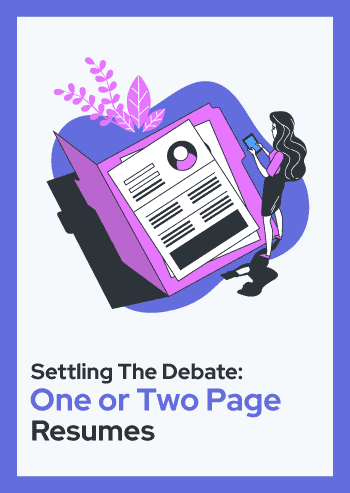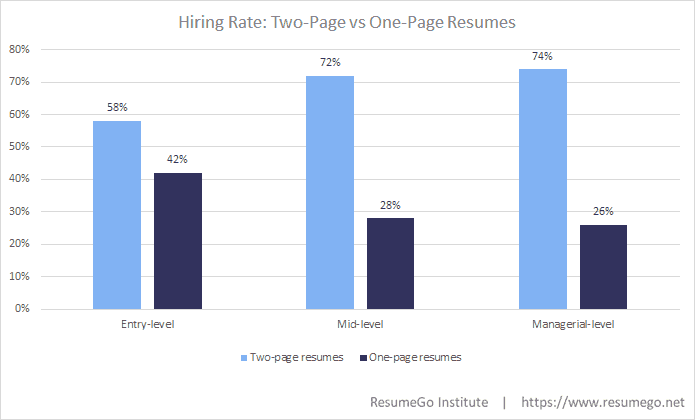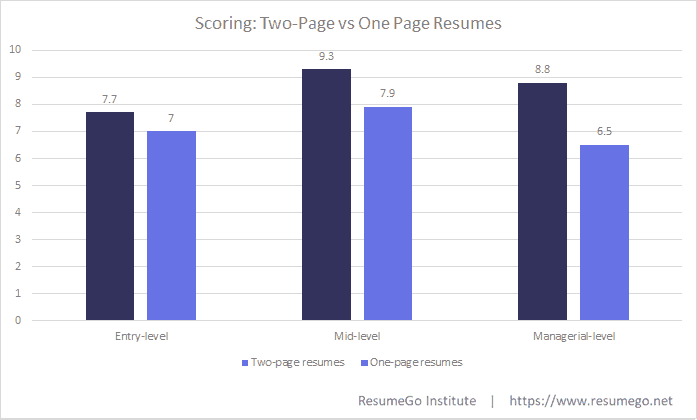Settling the Debate: One or Two Page Resumes
New study reveals that recruiters are 2.3 times as likely to prefer two-page resumes over one-page resumes

New study reveals that recruiters are 2.3 times as likely to prefer two-page resumes over one-page resumes
Whether a resume should go beyond one page in length has always been a widely controversial topic. Those who believe that resumes should always be a single page generally claim that hiring managers lose patience when reading through unnecessarily long resumes. On the other hand, proponents of longer resumes argue that they have more space to detail a candidate’s work experiences and accomplishments.
Despite the common arguments given on the matter, there is little to no empirical data to support either side. In fact, so-called “experts” often base their conclusions on individual preferences and unsubstantiated claims from random sources. Furthermore, recruitment methods and the hiring landscape are constantly evolving, so what may have been true in the past may no longer be the case today.
As a professional resume writing service, ResumeGo wanted to discover the optimal length for a resume. From October 15 to November 2, they conducted a study involving a total of 482 professionals, all of whom had direct experience with employee recruitment and were either recruiters, hiring managers, human resources professionals, or C-Suite level executives. These participants were put through a hiring simulation in which they were asked to screen resumes for a multitude of job positions.
Recruiters surprisingly prefer two-page resumes over one-page resumes regardless of the job level
According to the study results, out of the 7,712 resumes that participants chose in the simulated hiring process, a whopping 5,375 of these resumes were two pages in length. This means that recruiters were 2.3 times as likely to prefer two-page resumes over one-page resumes. A further breakdown of the results is shown in the chart below:
From the diagram, we see that participants were:
- 1.4 times as likely to prefer two-page resumes over one-page resumes when it came to entry-level job openings.
- 2.6 times as likely to prefer two-page resumes over one-page resumes when it came to mid-level job openings.
- 2.9 times as likely to prefer two-page resumes over one-page resumes when it came managerial-level job openings.
The findings that pertained to entry-level jobs were particularly surprising. While the overwhelming majority of career experts argue that a two-page resume should never be used unless a job seeker has many years of full-time work experience at multiple companies, our results contradict this piece of conventional wisdom. Study participants were clearly impressed by the sheer amount of information that can be conveyed on two-page resumes, as our one-page and two-page resumes were designed to showcase similar levels of work experience, academic achievement, and overall credentials.
Two-page resumes scored higher than one-page resumes
After reviewing each resume, participants were asked to score the resume from 0-10 based on how well the resume was able to “summarize the candidate’s work experiences and overall credentials.” Two-page resumes scored 21% higher with an average score of 8.6, compared to an average score of 7.1 for one-page resumes. A further breakdown of the scores based on job level is shown below:
These results indicate that the extra information contained on two-page resumes helped participants in their decision-making and cast a positive light on the job candidates – even when it came to entry-level job openings, though to a lesser degree.
Recruiters spent nearly twice as much time reading through two-page resumes
Not only did two-page resumes score higher than one-page resumes, recruiters were also willing to spend more time reading them. Participants were informed prior to the hiring simulation that their responses would be timed, and that they should screen resumes during the simulation in the same way they do in real-world hiring scenarios. Despite preconceived notions that recruiters are unwilling to spend more than a few seconds reviewing each resume, our study found that participants were spending 2 minutes 24 seconds on one-page resumes and 4 minutes 5 seconds on two-page resumes.
These results show that recruiters do indeed spend more time reviewing lengthier resumes instead of simply skimming over the content, which might help explain why two-page resumes are usually preferred over one-page resumes.
About the study
Participants of this study were put through a hiring simulation in which they were presented with a set of resumes to review for a variety of job positions across different industries. Both the resumes and the job descriptions used in the simulation were based on actual job candidates and job openings in the real world. After reading through the applicable resumes, participants were asked to select the ones they felt would be the best fit for the job opening in question.
The number of resumes paired with each job opening varied, and the number of resumes participants were asked to select for each job opening varied as well. For example, in one scenario presented within the simulation, participants were asked to review six resumes from imaginary candidates for a given job opening and were expected to choose two of them to potentially hire.
To ensure that both one-page and two-page resumes were equally represented, half of the resumes used in the simulation were one page in length, and the other half of the resumes were two pages in length. In particular, each one-page resume had a two-page counterpart representing a candidate with similar work experiences, academic achievements, and skills. All the resumes were printed on 8.5” x 11” pieces of paper. One-page resumes varied in length from 350 to 500 words while two-page resumes varied in length from 700 to 850 words.
Final Thoughts
Contrary to the common belief that resumes should be no more than one page in length, the results of the study suggest that recruiters actually prefer two-page resumes over one-page resumes on average. It’s possible that this preference is unbeknownst to the recruiters themselves, who may be unaware of their own tendency of favoring longer resumes. While this study is only a simulation intended to replicate how recruiters behave in real-world hiring scenarios, its results give us a far better understanding of how resume length may impact hiring decisions.
Two-page resumes were
2.3 times
as likely to be chosen by study participants
Two-page resumes scored
8.6
while one-page resumes only scored
7.1
Recruiters spend nearly
Twice
as much time reviewing two-page resumes as they do one-page resumes

